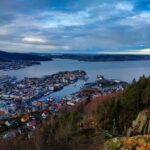Which country is the least corrupt in Africa and Why? You’ll find out in this article.
In 1966, while gaining independence from Great Britain, a poor African country was written off as a hopeless basket case. At the time, Botswana was an extremely poor country. The nation had a total of twelve kilometres of paved roads, twenty-two citizens who had graduated from university, and one hundred from secondary school, with GDP per capita of $70. Fast forward to 2007, Botswana had 7,000 kilometres of paved roads, and per capita income had risen to about $6,100 ($12,000 at purchasing power parity), making Botswana an upper-middle-income country comparable to Chile or Argentina.
At independence, life expectancy at birth was 37 years. By 1990 it was 60, 10 years above the African average. The country’s performance is particularly impressive compared with that of other African economies. And over the past 60 years, Botswana’s economy has been one of the most successful in the world.
The country is Africa’s second-largest producer of diamond and is the 5th best place to live in the continent. In this article, we explore the reasons why this rarely heard about the country is doing so well at tackling corruption in Africa.
1. Strong Institutions
According to Acemoglu and Robinson, authors of Why Nations Fail, the answer lies in the quality of Botswana’s political and economic institutions. In the aftermath of independence, the Botswana Democratic Party succeeded in creating robust institutions aimed at achieving political stability and long-term economic growth. Botswana is a consolidated democracy that has been holding free elections since 1966. On the economic side, Botswana is the second freest economy in Africa (only surpassed by Mauritius). It has a sensible regulatory environment and a reasonable rule of law. This facilitates the conduct of business and encourages foreign investments.
2. A tradition of consultation
Since independence, the leadership has designed and fostered the conditions of governance that have ensured stability and social and economic progress. The government maintained a high degree of transparency, which was reinforced by continuing the Tswana tribal tradition of consultation. These consultative institutions, known as kgotla, created a degree of trust in the government—the sense that government exists to serve the people and promote the development and is not the instrument of one group or individuals for the purpose of getting hold of the wealth. Tswana tradition also respected private property; the fact that many of the tribal leaders who helped usher in modern government were also large cattle owners may have reinforced this respect.
3. Colonization Intent
Most developing countries were colonized with the intent of exploitation from their colonial master, which is usually to the detriment of the people. In the case of Botswana, a British protectorate, the colonial power was invited in by the Elders to colonize the region. This was a strategic approach by the Bechuanaland chiefs (now Botswana) to protect its tribal land from colonial expansion. Because Botswana was not colonized for economic or strategic advantage, the colonial rulers, it is argued, did not impose the extractive-type regime often found in other African countries. As a result, the regime that evolved after independence was one that respected the law and property and was dedicated to development.
4. United by a common language and culture
The Botswana nation is equally multicultural and multilinguistic; but to create a unified nation and create a sense of national pride, Setswana was made the lingua franca. At least 70% of the population identifying Setswana as their mother tongue, and another 20% as a second language.
The founding leaders believed that for Botswana to be a nation; for Batswana (as the people from the nation are called) to feel patriotic, Setswana must be declared Botswana’s official language. For full national unity to occur Batswana must not only be united by a flag and a national anthem, but they must also be united by a common language and culture. We can arguably say that this sense of national unity has created a sense of accountability and patriotism among its citizens.
5. Democratic governance
Botswana has maintained a parliamentary democracy since independence. Without a doubt, its democracy is not perfect: the country has had a one-party rule since independence, women’s representation is limited, and there has been some criticism that minorities (particularly the San people) are not treated equally. Nevertheless, the government functions in a democratic manner, elections are “free and fair,” and the government is responsive to the electorate and transparent in its dealings. Botswana has long presented itself to other African countries as a shining example of what a democracy should look like.
6. Anti-corruption legislation
The country’s legislature has over the years passed stringent anticorruption bills with a stiff penalty for defaulters. There is Legislation in place to prevent money laundering and associated white-collar crimes and to ensure the integrity of operations carried out through the Botswana International Financial Services Centre (BIFSC). A recent amendment to the Serious Crimes Act has strengthened existing provisions on the prevention of concealment and disposition of the proceeds of crime. It is also now mandatory for banks and all other commercial firms to report any suspicious business relationships and transactions involving the transfer of cash into and out of Botswana, subject to stringent penalties.
7. Stiff penalty for corrupt practices
The penalties prescribed by the law for cases of corruption in Botswana are not mere slaps on the wrist. The country’s penal code recommends maximum penalties of up to 10 years imprisonment or a fine of BWP 500,000. Both punishments could also be applicable in certain cases. The conviction rates for corruption cases in the country are also high making it almost certain that anybody caught in the act will be made to face the consequences.
8. Encouragement of Whistleblowing
In its quest to encourage reporting crime, parliament enacted the Whistle Blowing Act in 2016, to protect whistleblowers from victimization and to encourage them to freely report without fear. Hotlines were issued to citizens and government employees to report corruption wherever they see it. The law also protects the identity of the whistleblowers who report bribery. This made it easy for employees and even ordinary citizens alike to report corrupt practices in real-time.
9. Avoiding the bad governance curse
Mineral-based countries seem to be prone to bad government, a phenomenon termed “good economics, bad politics.” In almost all developing countries, the government owns the mineral resources and is, therefore, the main recipient of the revenues from their extraction. This concentration of revenues with the government as the conduit of benefits to the rest of the economy can lead to a host of problems, including rent-seeking, corruption, and the efficiency losses that result from them. Botswana has avoided these manmade disasters by upholding property rights.
Governance has not been perfect in Botswana, but it has set a lot of positive examples of what is possible when people are united with a common identity and common aspiration. Botswana has been largely free of kleptocracy and civil conflict; it has maintained a transparent, law-abiding government; and it has implemented good policies. What are your thoughts on Botswana’s success story? Let us hear them in the comment section below.









